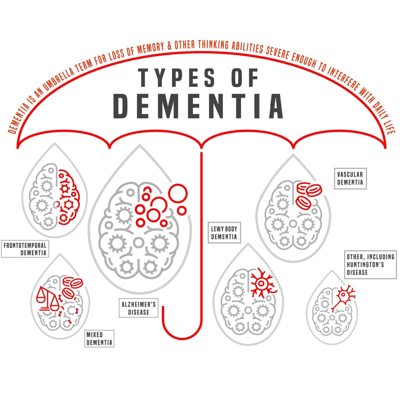13 Tips to Prevent Dementia

Some of the choices we make can impact our odds of developing dementia. Here are 13 tips for preventing cognitive decline.
Did you know that about one in five seniors over the age of 65 have mild cognitive impairment?
Though not everyone with cognitive impairment will develop dementia, it does tend to be an initial sign of things to come, as about 65% of those who are diagnosed with cognitive impairment eventually progress to dementia.[1]
The good news is that there are ways to reduce your risk of developing both mild cognitive impairment and dementia. Here are 13 tips to prevent dementia.
Let’s start with “Life’s Essential Eight.” That’s what the American Heart Association calls the eight factors that maintain or improve heart health.
Why does heart health matter for your brain? The vascular system that goes through the brain brings oxygenated blood to every cell to help them work properly. When that blood flow is compromised in some way, the brain can suffer. Cognitive decline and dementia can be one of the consequences.[2]
The “essential eight” are:
1. Control your blood pressure. High blood pressure can do damage to the veins and arteries over time, and that can make it difficult for the blood to pump through the body as it should. Hypertension is also linked to vascular dementia, which is a type of impairment that results from long-term compromised blood flow to the brain.
2. Control your cholesterol levels. If there is too much cholesterol in your blood, it can be deposited as plaque in the arteries, which narrows the vessels and leads to difficulty with blood flow. This is something that builds up over time and can eventually result in heart attack or stroke. It can also result in dementia as blood flow slows down over time.
3. Control your blood sugar levels. If your blood sugar levels stay high over time, you can eventually suffer from a variety of problems, including issues with your kidneys, eyes, heart, and nerves. But did you know that high blood sugar levels can also affect the tiniest blood vessels in your brain? If you have diabetes, keeping those numbers under control can keep you healthier in every way.
4. Control your weight. Studies have linked obesity and being overweight with a greater risk of dementia and other cognitive impairment. Besides protecting your brain health, maintaining a healthy weight can also affect other parts of your life, such as reducing your risk of diabetes.
5. Get plenty of physical activity. The World Health Organization recommends that seniors get 150 minutes of moderate physical activity each week. Most people choose to break that down into about 30 minutes of exercise a day, five days a week.[3] Keep moving to keep the blood flowing properly.
6. Eat the right foods. The Mediterranean Diet is great for not only your heart and overall health, but can specifically prevent cognitive decline and even boost memory and the processing ability of your brain. The MIND Diet - Mediterranean-DASH Intervention for Neurodegenerative Delay – is a modified version that specifically focuses on brain health.
7. Get good sleep. Most people need between seven to nine hours of sleep each night to function at their best. The brain repairs itself as you sleep, so if you aren’t getting enough or your sleep is broken, your brain will likely begin to suffer.
8. Don’t smoke. Though it’s been said time and time again, it bears repeating: Smoking affects every part of your body in a negative way, including boosting your risk of developing dementia. But studies have shown that if you quit, your body and brain welcome the opportunity to repair themselves. That means that when you stop smoking, your risk of dementia can diminish to the same as what anyone else might face. And remember, vaping is just as dangerous.
Other Ways to Prevent Cognitive Decline and Dementia
Though following the above tips is a strong plan for better health, there are even more things you can do to reduce your risk of issues with memory and cognition:
9. Build social circles. Isolation and loneliness are notoriously bad for seniors and some studies have linked being alone to developing dementia and other cognitive impairments. Reach out to friends and family, and build new connections through your local senior center, volunteer groups, community involvement, church, and more.
10. Check your hearing. The gradual hearing loss that comes naturally with age might be linked to cognitive decline, so now is a great time for a hearing test. Improving your hearing with hearing aids might actually help improve your memory.
11. Drink only in moderation. Alcohol is tricky when it comes to health. If you choose to enjoy adult beverages, do so wisely.
12. Get help for depression. If you are dealing with depression, reach out for help. Depression is a well-known risk factor for dementia and it can lead to other problems as well, such as sleep disorders and anxiety. Getting help can make you feel better now and later.
13. Learn as much as you can. Education keeps your mind moving, and that can strengthen the neural connections in the brain. You can learn in whatever way works best for you – take an online class, read a book on a new topic, watch a documentary, work a crossword puzzle, attend a lecture, and so much more.
Get Started Right Now
If you can start tackling all of the above tips, great! But even focusing on one or two can make a difference.
If you find that it’s hard to get motivated, reach out to a friend or family member who will take the journey to better health with you. Using the “buddy system” can go a long way toward holding each other accountable and making sure that new habits stick. Here’s to better brain health!
[1] https://www.apa.org/monitor/2019/10/ce-corner-impairment
[2] https://www.heart.org/en/healthy-living/healthy-lifestyle/lifes-essential-8
[3] https://iris.who.int/bitstream/handle/10665/337001/9789240014886-eng.pdf

